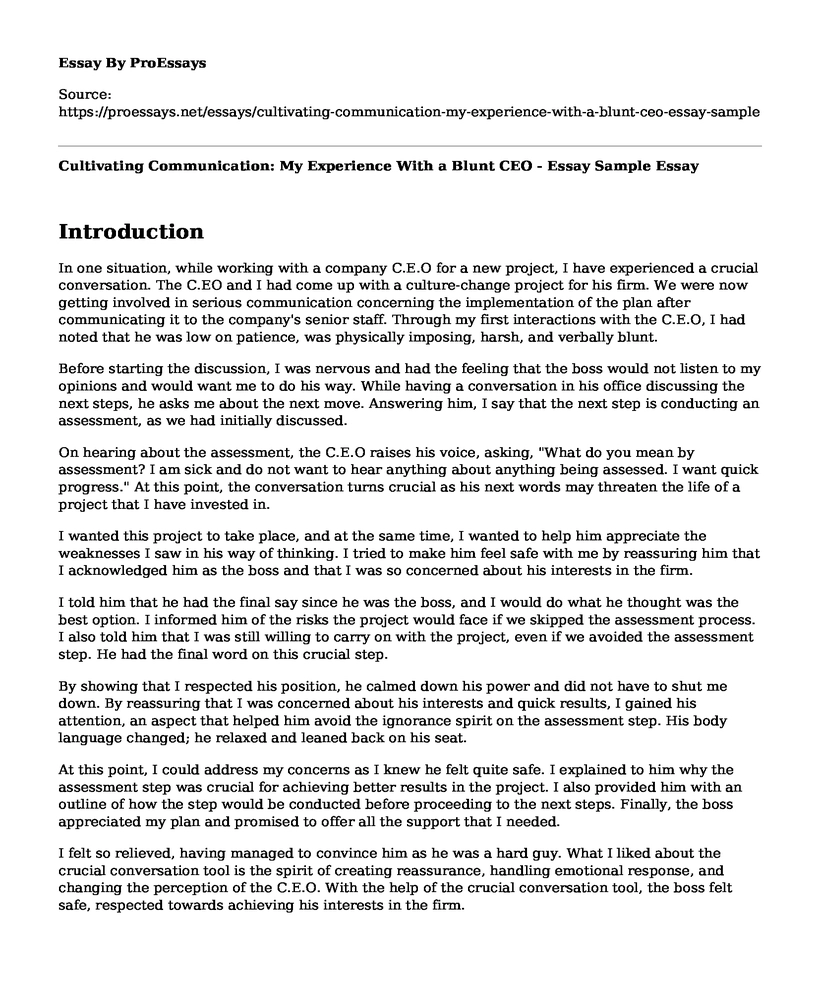Introduction
In one situation, while working with a company C.E.O for a new project, I have experienced a crucial conversation. The C.EO and I had come up with a culture-change project for his firm. We were now getting involved in serious communication concerning the implementation of the plan after communicating it to the company's senior staff. Through my first interactions with the C.E.O, I had noted that he was low on patience, was physically imposing, harsh, and verbally blunt.
Before starting the discussion, I was nervous and had the feeling that the boss would not listen to my opinions and would want me to do his way. While having a conversation in his office discussing the next steps, he asks me about the next move. Answering him, I say that the next step is conducting an assessment, as we had initially discussed.
On hearing about the assessment, the C.E.O raises his voice, asking, "What do you mean by assessment? I am sick and do not want to hear anything about anything being assessed. I want quick progress." At this point, the conversation turns crucial as his next words may threaten the life of a project that I have invested in.
I wanted this project to take place, and at the same time, I wanted to help him appreciate the weaknesses I saw in his way of thinking. I tried to make him feel safe with me by reassuring him that I acknowledged him as the boss and that I was so concerned about his interests in the firm.
I told him that he had the final say since he was the boss, and I would do what he thought was the best option. I informed him of the risks the project would face if we skipped the assessment process. I also told him that I was still willing to carry on with the project, even if we avoided the assessment step. He had the final word on this crucial step.
By showing that I respected his position, he calmed down his power and did not have to shut me down. By reassuring that I was concerned about his interests and quick results, I gained his attention, an aspect that helped him avoid the ignorance spirit on the assessment step. His body language changed; he relaxed and leaned back on his seat.
At this point, I could address my concerns as I knew he felt quite safe. I explained to him why the assessment step was crucial for achieving better results in the project. I also provided him with an outline of how the step would be conducted before proceeding to the next steps. Finally, the boss appreciated my plan and promised to offer all the support that I needed.
I felt so relieved, having managed to convince him as he was a hard guy. What I liked about the crucial conversation tool is the spirit of creating reassurance, handling emotional response, and changing the perception of the C.E.O. With the help of the crucial conversation tool, the boss felt safe, respected towards achieving his interests in the firm.
Crucial conversation in such an environment is built on mutual respect and mutual purpose. Through these principles, it becomes possible for seniors to listen to ideas from their juniors to the point of mutual understanding. Since I was the junior in this situation, my communication traits should be different from that of the boss to create an environment where he feels he has the final say.
References
Ariely, D. (2009, February). Our buggy moral code. Retrieved from https://www.ted.com/talks/dan_ariely_our_buggy_moral_code?language=en
Grenny, J. (2012, June 29). Crucial Conversations [Video file]. Retrieved from https://www.youtube.com/watch?v=saCAmw1MS2c
Grenny, J. (2012, December 14). Crucial Conversations [Video file]. Retrieved from https://www.youtube.com/watch?v=PuJgqTs-G44
Cite this page
Cultivating Communication: My Experience With a Blunt CEO - Essay Sample. (2023, Mar 28). Retrieved from https://proessays.net/essays/cultivating-communication-my-experience-with-a-blunt-ceo-essay-sample
If you are the original author of this essay and no longer wish to have it published on the ProEssays website, please click below to request its removal:
- Multidimensional Theory of Gender Inequality Essay Example
- Essay Sample on Unleashing the Power of Social Movements: Types, Strategies & Theories
- Essay Sample on Indiana Teens: Substance Abuse & Mental Health Risk
- U.S. Population in 2030: Rising Older Generation Challenges Demographics - Essay Sample
- Gentrification: Transforming Neighborhoods Into Vibrant Communities - Essay Sample
- New Fathers: Transitions, Changes, and Expectations - Essay Sample
- Paper Example on Ethical Dilemmas in Healthcare: Resolving Conflicting Priorities







